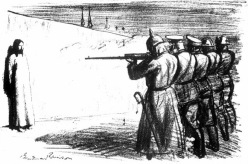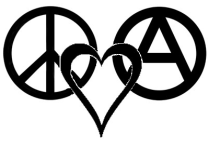 Is the universe orderly, or chaotic and in need of taming? Are humans born good and altruistic, or are they genetically inclined to evil and selfishness? Is it nature or nurture that determines the character of humans? These questions have been debated for ages, but for anarchists they are integral to understanding their ideology.
Is the universe orderly, or chaotic and in need of taming? Are humans born good and altruistic, or are they genetically inclined to evil and selfishness? Is it nature or nurture that determines the character of humans? These questions have been debated for ages, but for anarchists they are integral to understanding their ideology.
Judith Suissa notes that “many of the criticisms of anarchism as a viable political ideology … hinge on the concept of human nature” (2010: 24). Though there is a spectrum of viewpoints within anarchism about the nature of humanity (as there is in Christianity), anarchism by its own admission must validate the possibility that humans have an innate desire to organize and live freely, peacefully, and cooperatively. Thus, for anarchists to hold a negative view of humanity would seem to fly in the face of one of anarchism’s core beliefs: the possibility of living without a hierarchical authority or State.
Peter Kropotkin
Despite the myriad wars and violence between humans throughout history, that same human history also points to a clear truth that humans have survived primarily because of their conscious and instinctual desire to cooperate, to live at peace and in freedom with one another. In his book Mutual Aid, Peter Kropotkin makes the case for a positivistic view of humanity, and that humans have evolved into conscious social beings destined to practice solidarity. “The mutual-aid tendency in man has so remote an origin, and is so deeply interwoven with all the past evolution of the human race, that it has been maintained by mankind up to the present time, notwithstanding all the vicissitudes of history” (Kropotkin, 1902: 223).
Statists, however, will likely claim that it is human’s natural competitiveness which makes our species so resilient, hence the need for institutionalized government and control over the self-centeredness of humankind. Since, as the Statists might say, we are born with an instinct towards selfishness and competition, certainly we would have killed ourselves off if not for the restraining force of law and order imposed by some hierarchical authority.
Nevertheless, history has also shown that societies have existed and others exist today because of voluntary cooperation and not competition, without imposed hierarchical order. Bernie Sanders spoke on TV the other day about his very democratic childhood growing up in Brooklyn, where there was so little parental control and supervision because kids were rarely allowed to be home before dinner. He spoke of the voluntary democratic collaboration between diverse children on the playground or in the streets. I remember this as well when I was growing up in the Bronx, playing stickball or other games without imposed leaders or authorities commanding our obedience.
Thus, my wife and I don’t encourage our children towards competitiveness, and in our homeschool co-op we emphasize, as a sort of compromise, the use of the portmanteau co-opetition. Our kids learn when playing team sports the value of working together to do well, and not against the other team to beat them. There need not be winners and losers. Henry Gartland Rice wrote in an oft quoted poem about God’s idea of competition:
“For when the One Great Scorer comes
To mark against your name,
He writes – not that you won or lost –
But how you played the Game.”
I hear Kropotkin crying from his grave approvingly, “Don’t compete! — competition is always injurious to the species, and you have plenty of resources to avoid it!” (1902: 74-75).
I noted in another post that Kropotkin had an anti-religious bent, and that he downplayed the importance of the Judeo-Christian notion of “love of neighbor.” He seems to believe that love is not the key to mutuality, but that there is in the conscience of man something deeper than love: “Love, sympathy and self-sacrifice certainly play an immense part in the progressive development of our moral feelings. But it is not love and not even sympathy upon which Society is based in mankind. It is the conscience—be it only at the stage of an instinct—of human solidarity” (1902: xiii). As Christian anarchists we don’t have to disagree completely with Kropotkin, but simply know that it is our concept of love which is at that “stage of an instinct” and which imbues the conscience of humans as a gift of our Creator.
Christian Views of Human Nature
Just as there is a secular debate over nature vs. nurture, there have been strong opinions in Christian circles over whether humans are born basically good and interdependent (as in contemporary Catholicism and progressive Protestantism), or are we totally depraved and genetically prone to sinfulness (as in Calvinism and Evangelicalism)?
However, it should be clear by now that the nature/nurture debate is grossly limited by the dualism and scientism of modernity. Spiritual discernment says there are other possibilities; mysterious and potent forces are working in our hearts, not just in our minds, to do the good that is in each human. This spirituality transcends the nature/nurture debate and creates the possibilities that even the worst sort of sinners can be redeemed by supernatural forces working in concert with the God consciousness in each of us—which is the working of the Spirit of Christ.
Nevertheless, I believe that all of us may have innate tendencies towards both selfless (good) and selfish (evil) behavior. But humans, because of their God-given conscience, are continually being prompted by the Spirit within them to choose selflessness. And only as one might go against his or her own conscience do they choose selfishness (evil). Thus, we must nurture the goodness that is already in our hearts to the glory of God and to promote the common good.
(The philosophical basis for this kind of positivism may be found in less nihilistic versions of Existentialism. Simone de Beauvoir opens her book The Ethics of Beauty with Montaigne’s poignant words “Life itself is neither good nor evil, it is the place of good and evil, according to what you make it.”)
The Bible & Human Nature
I believe the Bible portrays humans as having enough freedom to be fully responsible for our actions, feelings, and thoughts, but recognizing that our freedom is often limited, to a greater or lesser degree, by genetic, social, and cultural factors. The parables of the Creation/Fall story and the Book of Job are instructive in this regard, as well as the breadth of Scripture, especially in the history altering coming of Christ and impartation of the Holy Spirit on all flesh (Jo 2:28/Ac 2:17-18). Thus, we are free indeed, as Jesus said (Jn 8:36), but not unlimitedly so, because humans are finite beings. St. Paul said, “For now we see in a mirror indirectly, but then we will see face to face. Now I know in part, but then I will know fully, just as I have been fully known” (1 Co 13:12, NET).
Yet, everyone us can transcend our current realities, but only in as much as we are open to make choices congruent with our freedom and responsibility to God and others. We can all participate in the process of our own becoming, not only for our own sake, but also, and primarily, for the common good.
Thus, the nature vs. nurture debate limits the possibility of moving towards creating anarchistic societies, because it does not take into account the working of God’s Spirit in the world of those who believe. Christianity, and other spiritualties or religions, contribute another factor to the nature/nurture debate which is based on freedom, and that is the Spirit of Freedom’s interaction in our lives and the lives of those around us. That is why we hear of people, over and over again, transcending their own realities, becoming what most believed they could not become—utilizing their freedom to dream and create new possibilities. And that is why I can expect that because God’s creative image is implanted in each person, we are all called to work towards our own transcendence, to become fully free and responsible human beings.
Kropotkin’s notion of Mutual Aid describes, as I see it, a secular vision of the freedom and interrelatedness of God, self, and others. The State and organized hierarchical religion limit this exercising of our freedom by assuming too much responsibility for our lives. Each unique, God-imaged, and dignified person must live out their freedom and responsibility to the fullest extent, and realize that as Simone de Beauvoir said, “Man is free, but he finds his law in his very freedom” (1948: 170).
References
de Beauvoir, Simone (1948). The Ethics of Beauty. New York, NY: The Philosophical Library.
Kropotkin, Peter (1902). Mutual Aid. A Factor of Evolution. New York, NY: McClure and Phillips & Co.
Suissa, Judith (2010). Anarchism and Education. Oakland, CA: PM Press.
© Pablo de la Paz, 2016
 In a few weeks I and hundreds of millions of other Christians will celebrate the Feast of Pentecost. Many traditionalist Christians call this the date in Christian history as the day the Church was born or the day when the Holy Spirit came upon the Church. But what if Pentecost is really about the beginning of the anarchist movement to implement Christ’s Commonweal of Love (the unkingdom of God)?
In a few weeks I and hundreds of millions of other Christians will celebrate the Feast of Pentecost. Many traditionalist Christians call this the date in Christian history as the day the Church was born or the day when the Holy Spirit came upon the Church. But what if Pentecost is really about the beginning of the anarchist movement to implement Christ’s Commonweal of Love (the unkingdom of God)? As I have been reflecting on Jesus as the prototypical anarchist and examining if he had an anarchistic program or not, I have come to three general conclusions. This is a summary of what I have been saying over the past several months in this blog.
As I have been reflecting on Jesus as the prototypical anarchist and examining if he had an anarchistic program or not, I have come to three general conclusions. This is a summary of what I have been saying over the past several months in this blog. Christian anarchy is an inner discipline, a radical spirituality if you will. It is focused on how the Christian is progressively true to him or herself in the immediate world they find themselves in. Bamyeh says, “To the extent that we live still, our sense of our humanity resides in the knowledge that we are who we decide to become. Anarchy begins and ends here, from intelligent practice of becoming on earth” (2009: 8). This process isn’t only true self-discovery, but also resistance to everything that we ought not be. For those are the things we must resist!
Christian anarchy is an inner discipline, a radical spirituality if you will. It is focused on how the Christian is progressively true to him or herself in the immediate world they find themselves in. Bamyeh says, “To the extent that we live still, our sense of our humanity resides in the knowledge that we are who we decide to become. Anarchy begins and ends here, from intelligent practice of becoming on earth” (2009: 8). This process isn’t only true self-discovery, but also resistance to everything that we ought not be. For those are the things we must resist! The motto of the Army Chaplaincy (for which I once served) is Pro Deo et Patria, or For God and Country. This motto is a clear violation of Christ’s teaching which says, “No servant can serve two masters, for either he will hate the one and love the other, or he will be devoted to the one and despise the other. You cannot serve God and [Mammon]” (Luke 16:13, NET).
The motto of the Army Chaplaincy (for which I once served) is Pro Deo et Patria, or For God and Country. This motto is a clear violation of Christ’s teaching which says, “No servant can serve two masters, for either he will hate the one and love the other, or he will be devoted to the one and despise the other. You cannot serve God and [Mammon]” (Luke 16:13, NET). In just the past few weeks I was informed that four of my neighbors were moving. Aaron, next door, and Margie, next to Aaron. Phil and his two-year-old son, right across the street, and Charlie and Ruth, two houses down. My daughter’s friend Latasha is moving to another state in a few weeks, and my son’s friend Jonathan moved recently as well. Many of my kid’s best friends have moved away over the past three years. Yes, they will make new friends, and we will have new neighbors, but something is dreadfully wrong with this picture. The sadness that we feel is deep; and yet I know that I and my family should not think we are immune from suffering. But the notion of society, of being social beings, of being human, of being in community is practically gone. Simple anarchism seems to me to be the only answer to right this wrong.
In just the past few weeks I was informed that four of my neighbors were moving. Aaron, next door, and Margie, next to Aaron. Phil and his two-year-old son, right across the street, and Charlie and Ruth, two houses down. My daughter’s friend Latasha is moving to another state in a few weeks, and my son’s friend Jonathan moved recently as well. Many of my kid’s best friends have moved away over the past three years. Yes, they will make new friends, and we will have new neighbors, but something is dreadfully wrong with this picture. The sadness that we feel is deep; and yet I know that I and my family should not think we are immune from suffering. But the notion of society, of being social beings, of being human, of being in community is practically gone. Simple anarchism seems to me to be the only answer to right this wrong. After just a few hundred years, as the Church grew rapidly despite intense persecution and without any political power, Christianity suffered its greatest blow to its credibility and viability as a movement of God’s authentic people. In 313 the Church went to bed with Emperor Constantine and became part of the Kingdom powers of this world. The late Phyllis Tickle, encouraged by a new movement of authentic Christian faith in the 21st century, remembered this situation all too well. “[T]here is no question that Constantine’s preempting of Christianity in the fourth century was the great pivot point by means of which Christianity became a dominant institution” (2008: 161). This pivot point is commonly known as the beginning of Christendom (Christian + Kingdom), which I believe should be known as the era of Christendumb.
After just a few hundred years, as the Church grew rapidly despite intense persecution and without any political power, Christianity suffered its greatest blow to its credibility and viability as a movement of God’s authentic people. In 313 the Church went to bed with Emperor Constantine and became part of the Kingdom powers of this world. The late Phyllis Tickle, encouraged by a new movement of authentic Christian faith in the 21st century, remembered this situation all too well. “[T]here is no question that Constantine’s preempting of Christianity in the fourth century was the great pivot point by means of which Christianity became a dominant institution” (2008: 161). This pivot point is commonly known as the beginning of Christendom (Christian + Kingdom), which I believe should be known as the era of Christendumb. What Is A Sacrament?
What Is A Sacrament? In 1983, one of my college professors (I can’t be sure, but I think it was Sidney Helfent) used the word “paradigm” in such a way that I have never been able to forget. He defined it not only as a theoretical model or construct, but as a unique “jumping off point” or “place of departure” for theory making. Thus, a paradigm shift, a la Thomas Kuhn’s Structure of Scientific Revolutions, isn’t only a radical replacement theoretical model or construct, but first and foremost a new jumping off point—a unique way of seeing.
In 1983, one of my college professors (I can’t be sure, but I think it was Sidney Helfent) used the word “paradigm” in such a way that I have never been able to forget. He defined it not only as a theoretical model or construct, but as a unique “jumping off point” or “place of departure” for theory making. Thus, a paradigm shift, a la Thomas Kuhn’s Structure of Scientific Revolutions, isn’t only a radical replacement theoretical model or construct, but first and foremost a new jumping off point—a unique way of seeing.
 Is the universe orderly, or chaotic and in need of taming? Are humans born good and altruistic, or are they genetically inclined to evil and selfishness? Is it nature or nurture that determines the character of humans? These questions have been debated for ages, but for anarchists they are integral to understanding their ideology.
Is the universe orderly, or chaotic and in need of taming? Are humans born good and altruistic, or are they genetically inclined to evil and selfishness? Is it nature or nurture that determines the character of humans? These questions have been debated for ages, but for anarchists they are integral to understanding their ideology. I returned last Monday refreshed from a weekend in New York after meeting with my fellow clergy at our annual conference. One of our bishops spoke about the sad state of the Church, noting how few Christians understand the spiritual reality of the Kingdom of God which Jesus proclaimed. He quoted the biblical scholar Gordon Fee who said, “… it is fair to say that to miss—or to misunderstand— [the term the kingdom of God] is to miss Jesus altogether” (164).
I returned last Monday refreshed from a weekend in New York after meeting with my fellow clergy at our annual conference. One of our bishops spoke about the sad state of the Church, noting how few Christians understand the spiritual reality of the Kingdom of God which Jesus proclaimed. He quoted the biblical scholar Gordon Fee who said, “… it is fair to say that to miss—or to misunderstand— [the term the kingdom of God] is to miss Jesus altogether” (164).